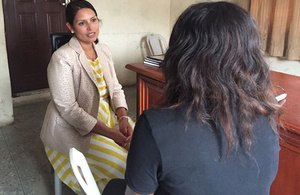Nigeria is the fourth largest source of human trafficking to the UK, and the International Organization for Migration estimates that approximately 80% of girls arriving to Europe from Nigeria through irregular migration are potential victims of trafficking for sexual exploitation.

According to latest figures, 875,500 Nigerians are living in modern slavery worldwide, including in the UK, and Ms Patel heard from counsellors at a safe house in Lagos, run by Nigeria’s National Agency for the Prohibition of Trafficking in Persons (NAPTIP), who have helped some of these vulnerable people.
The UK is cracking down on the barbaric crime of modern slavery in Nigeria, International Development Secretary Priti Patel announced, as she called for a world free from this abhorrent trade.
During a visit to a Nigerian safe house home to child victims as young as seven, Ms Patel met survivors of modern slavery and announced increased support to provide alternative jobs and livelihoods for potential victims of trafficking and modern slavery, including support for those who become victims to help them reintegrate into society and to protect them from re-trafficking – reducing a crime that directly affects the UK.
During a joint visit to Nigeria alongside Foreign Secretary Boris Johnson, Ms Patel raised the issue of trafficking at the highest levels in government and challenged the political and cultural acceptance of modern slavery, a trade which earns more for criminals around the world than any other, apart from the illegal drug trade.
International Development Secretary Priti Patel said: It is shameful that in the 21st Century the evil crime of modern slavery lurks in every corner of the globe, including on the UK’s streets, destroying the lives of young men, women, and children. We will not stand aside and ignore this barbaric and often invisible crime, which all too often reaches our shores and is damaging for everyone except the perpetrators.
The UK is a global leader in stamping out modern slavery, pressing the international community including the Nigerian Government to tackle this crime at source, bringing perpetrators to justice and protecting victims who have been subject to unimaginable horrors.
Our support is offering vulnerable girls and women an alternative life to slavery and exploitation and helping them reintegrate into society, stopping vicious cycles of abuse and creating a more prosperous and secure future for thousands, as well as for us at home.
The Prime Minister Theresa May has made clear that tackling modern slavery is a top priority for the UK, creating the world-leading Modern Slavery Act in 2015 and establishing the cross-government taskforce, which includes the International Development Secretary.
In the safe house, Ms Patel saw children some as young as seven years old who have been trafficked across the world, including to the UK, Europe, Libya and other countries across Africa. She vowed to challenge the cultural acceptance of human exploitation; often young girls and boys who end up trapped in this abusive trade are encouraged by their families to risk their lives in search of money and a better future.
This new package of support builds on progress already being made by the UK in Nigeria and across the world. The UK’s existing support to Nigeria is helping to support investigations and bring perpetrators to justice, as well as providing protection for victims.
The British Government is driving reform within the international system to coordinate a more effective and focused approach to stamp out this exploitation.
Kindly follow us on twitter:@AfricanVoice2









